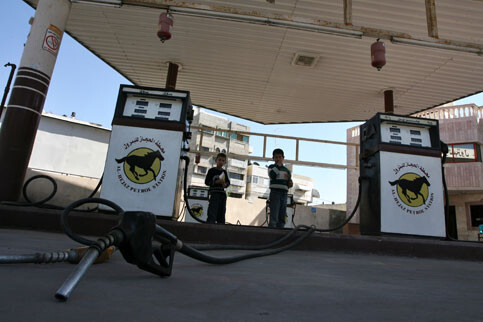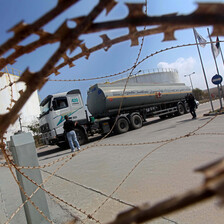Alternative Information Center 3 April 2008

A Gaza petrol station where fuel supplies ran out, April 2008. (Wissam Nassar/MaanImages)
Over a year has passed since Israel privatized its oil refineries in Haifa and Ashdod to private companies. The Haifa refineries were bought by a group of investors lead by the Ofer brothers, two of Israel’s richest capitalists through their company Israel Corp. The Ashdod refineries were bought by the Paz petrol company owned by Zadik Bino.
The privatization, one of the biggest in Israel’s history, has transformed the petrol market in Israel at a time when oil prices are soaring and affect every aspect of the Israeli (and the Palestinian) economy — through increase in transportation costs, in heating costs in the winter, in the price of electricity and even in the costs of basic foodstuffs (which require oil products as part of their production system).
A privatization process that raises many questions
Throughout the privatization process the Israeli government was accused by Israeli non-governmental organizations that the privatization is handled in a poor fashion, with little regards to issues of proper conduct, to issues of environmental safety and to ensuring that the proper price is paid for the refineries. A smell of corruption was hanging in the air when it was published that one of the main government officials involved in the privatization process was later hired by the Ofer Brothers to occupy a high-paying prestigious position in Israel Corp.
The charter of the refineries was due to expire in 2003, and the Movement for the Quality of Government in Israel argued that the government should demand the stocks owned by the Ofer brothers and is not obligated to offer payment for them. The Israeli government, however, conducted prolonged and difficult negotiations with the Ofer brothers in order to buy back the stocks that they owned in the refineries, only to resell the stocks back to them in the privatization process. The breakneck speed that was adopted by the government to push forward the privatization has undermined its bargaining position, making it pay a great deal of money for stocks that it could probably have taken for free when the refineries’ charter expired in 2003.
Several capitalists who demonstrated their interest in purchasing the refineries were disqualified by Israel’s Ministry of Defense, thus limiting the options of the government concerning who they can sell the refineries to.
In the end, the privatization process was dominated by a small group of capitalists that divided the spoils between them, taking almost full control of Israel’s petrol market. Prices of petrol were quickly raised by the new owners, demonstrating that the privatization ended up creating a duopoly (a monopoly by two companies), and that competition in petrol prices is not likely to come anytime soon.
The sum of US $2.34 billion that the Israeli government received for the refineries hardly seems to justify the numerous problems that the Israeli economy faces in the aftermath of privatization.
Why was Israel so keen to sell?
The question that inevitably rises from this is why was the Israeli government so determined to sell the refineries, ignoring the warning signs and numerous obstacles along the way?
The answer is deeply rooted to Israel’s political and economic situation as a colonial power controlling the Palestinian territories. Though the Israeli government has vowed to balance its budget, to lower taxes and to cut its welfare budgets (in order to appease neoliberal economists and avoid a massive escape of foreign investors), it is also committed to maintaining the money-guzzling apparatus of the occupation, including a welfare state for settlers only in the West Bank and a military-industrial complex to maintain Israel’s military superiority in the Middle East.
This internal contradiction between the “old” and “new” economy so deeply rooted in Israeli economic policies has created a desperate need for funds. Israel needs fast cash in order to keep up the appearance of a prosperous economy, because officials fear that an economic crisis will also weaken its military strength.
Thus, Israel is pursuing a policy of quick privatization in order to fund this internal contradiction. After privatizing Israel’s biggest bank, shipping company, telecommunications company and even parts of its employment service, Israel moved to sell one of its biggest industrial assets, the oil refineries. Currently it plans to privatize the postal office, the electricity company, parts of the health and education systems and the list goes on.
Eventually, however, the Israeli government will run out of companies to sell, and the income inflow will end.
Why is it relevant to the occupied Palestinians?
What may appear to be an internal Israeli matter, has in fact a crucial impact on the Palestinian economy in the West Bank and Gaza Strip as well.
The Palestinian economy has become dependent on the Israeli economy after almost 41 years of policies designed to prevent Palestinian development of local sources of income. The current economic arrangements between Israel and the Palestinians make it almost impossible for the Palestinians to import energy (oil, petrol, gas and electricity) from anywhere but Israel. The Palestinian Authority signed an agreement with the Paz company, making it the sole supplier of petrol to the West Bank (the Gaza Strip is still, irregularly, supplied by the Dor Alon company under the terms of an older agreement).
When Paz bought the Ashdod refineries, it established for itself a line of direct control from the crude oil arriving at the Israeli port to the Palestinian gas station, avoiding any kind of competition along the way.
International law (and common sense) stipulates that the ongoing occupation in both the West Bank and Gaza makes Israel responsible for the Palestinian economy. Availability of affordable energy is vital for the most basic aspects of life: cooking, light, heating in winter, water pumps, transportation and manufacturing.
The privatization creates another hurdle between Palestinians and the energy resources which they sorely need. It means that in addition to the strict “security” regulations imposed by the Israeli government, such as the back-to-back system, which disrupt supply to the Palestinian market and create higher costs, the Palestinians must also contend with the whims of a single private company that can decide to delay shipments or increase prices due to its own economic considerations.
Paz’s response to claims that the privatization of the refineries could have negative implications to both the Israeli and the Palestinian populations was that Paz is simply the purchaser of the refineries and that it has no interest in the social implications of the privatization, which it sees solely as the responsibility of Israel’s Government Companies Authority.
A change is necessary in the struggle against the occupation
There is little that can be gained from lamenting yet another Israeli policy that hurts the Palestinian population and that is a violation of Israel’s responsibility as the effective sovereign power and occupier.
What should be done is to turn this privatization from a setback into an opportunity. As Israel gradually privatizes aspects of the repression mechanisms that it uses against the Palestinians (including, for example, the checkpoints themselves), the private companies become legitimate and vulnerable targets for political resistance.
By focusing on the companies that are willing to take upon themselves to repress the Palestinians on Israel’s behalf, the resistance against the occupation takes on another dimension — that of economic resistance.
An effective campaign against private companies that act against the Palestinians will result in severely limiting the ability of the Israeli government to keep privatizing, in limiting the economic resources available to the government to keep using violence against the Palestinians and also to raising international awareness to the crimes of the occupation.
Download the full report [PDF]
The Alternative Information Center, www.alternativenews.org, is an Israeli-Palestinian organization which engages in dissemination of information, political advocacy, grassroots activism and critical analysis of the Palestinian and Israeli societies as well as the Israeli-Palestinian conflict. It is one of the oldest non-governmental organizations working towards ending the Israeli occupation.





